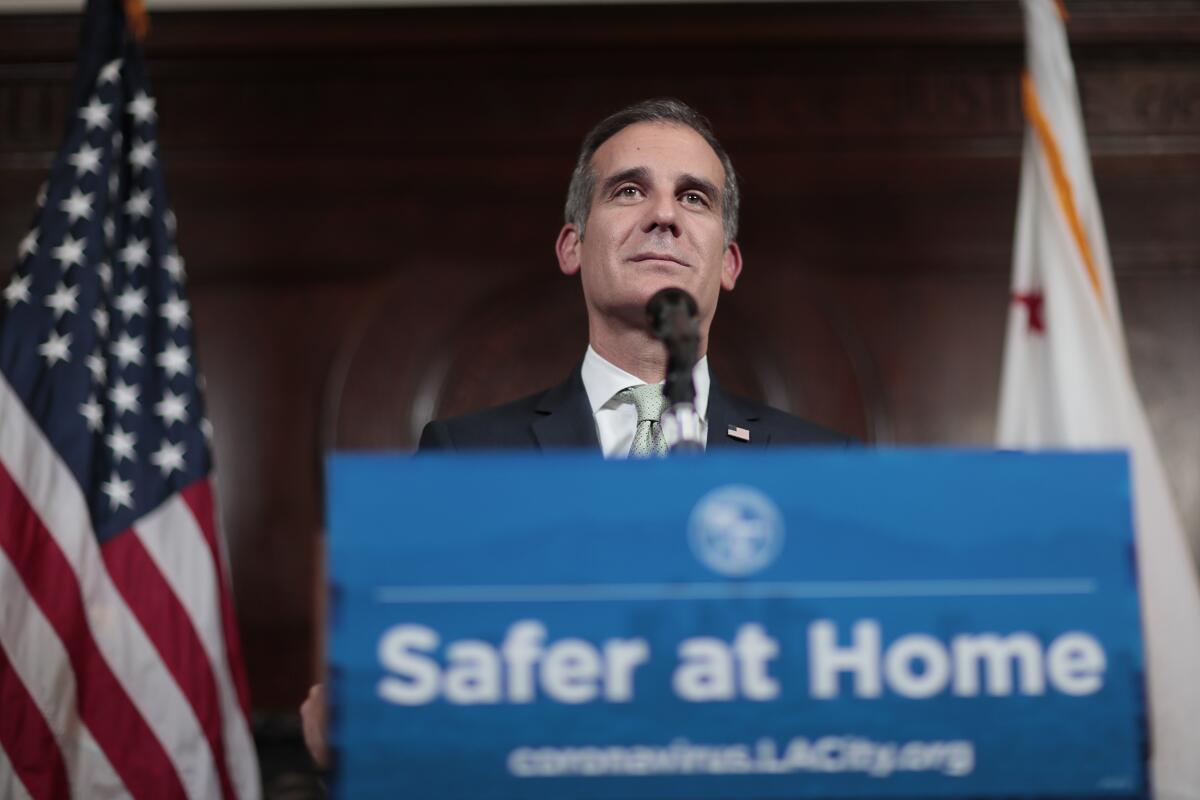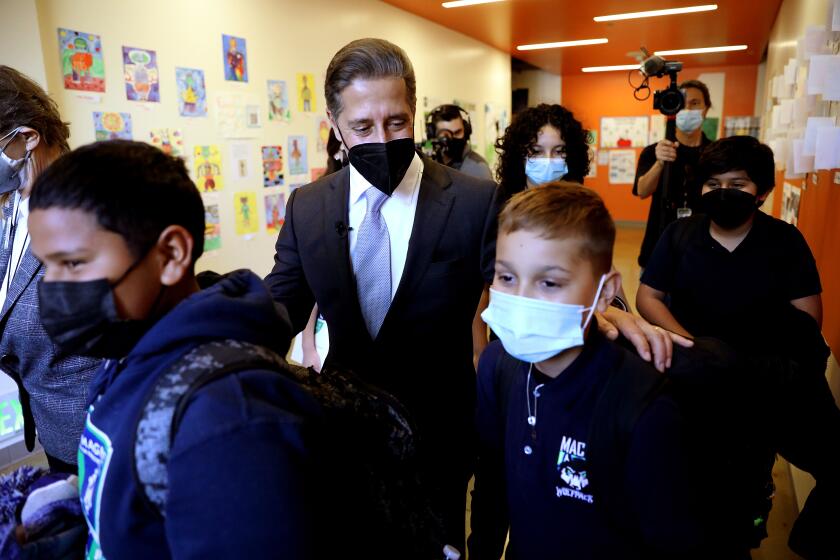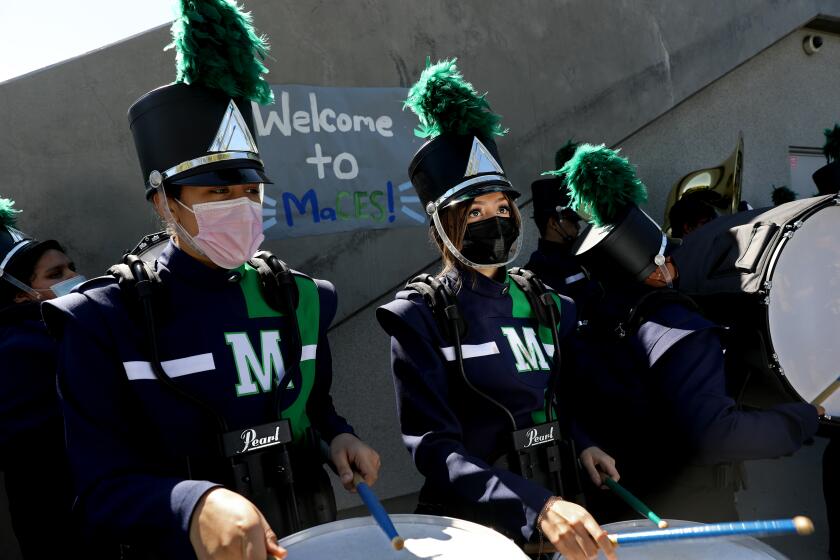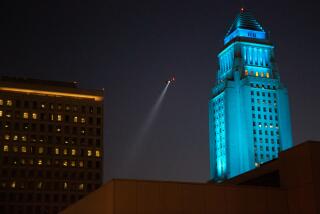Communication problems hindered L.A.’s emergency COVID-19 response, report finds

A review of Los Angeles’ emergency response to the COVID-19 pandemic found that Mayor Eric Garcetti and his team excluded city departments when making decisions, resulting in an “uncoordinated and inefficient” operation.
The draft report, which was reviewed by The Times, praises the city’s emergency operations workers, who worked out of a downtown facility while much of the city remained shut down.
And Garcetti “acted quickly and decisively on many fronts, often with innovative initiatives to help protect the city and its people,” the report found.
But the lack of transparency from Garcetti’s office helped fuel two simultaneous and parallel emergency operations — one led by the mayor and one led by the head of the city’s Emergency Management Department, or EMD, the report found.
The 216-page draft report by CPARS Consulting gives an insider’s view of the mayor’s office during the health crisis.
The timetable to lift the indoor mask mandate potentially could be even shorter if the federal guidance on face coverings changes.
Researchers reviewed thousands of documents and interviewed more than 150 staff and representatives of partner organizations, according to the draft report.
EMD spokeswoman Jessica Kellogg said the report, which was first reviewed by city staff last fall, was a “leaked early draft” and that an updated version will be finished by midyear. She also said it contains errors and misrepresentations, but declined to name the errors.
“While some comments may reflect personal opinions of a few of those interviewed, they do not reflect an accurate account and understanding of the reality of the emergency response while we were in the midst of a complex global crisis,” Kellogg said.
Asked about the report, Jeff Gorell, a former deputy mayor under Garcetti, said the mayor’s “swift, decisive action at the beginning of the pandemic saved lives.” He also pointed to the city’s testing and vaccination programs, adding that “we did not hesitate to cut through bureaucracy.”
“As we reflect on lessons learned, I think all of us should look back with humility and pride in the way EMD and all of our departments have come together to lead L.A. through this crisis,” Gorell said.
Nick Lowe, president and chief executive of CPARS Consulting, said the report is going through a revision process that includes gathering more data. His company “stands by the integrity of each iteration of the report at the time they were drafted,” he said.
The draft report covered the start of the pandemic until April 2021 and focused only on the city’s emergency management system, which includes the “structures in place to support and enable field operations, programs, and service.”
While the EMD was tasked with leading the pandemic response, Garcetti also took a lead role, which was within his rights, but not anticipated by the EMD.
“When the mayor and his office assumed that role for the COVID-19 pandemic, not surprisingly, the emergency operation was uncoordinated and inefficient,” the report found.
“One could not have expected the mayor’s office staff to understand how to integrate into the city’s emergency operations since they had never been exposed to that role; especially when those experienced in the city’s emergency operations did not foresee that possibility prior to the pandemic nor properly react to it when it was playing out,” the report found.
Senior officials from the city’s emergency response team and the mayor’s office told researchers that as the pandemic went on, “they never had a formal discussion regarding who was in charge and what it meant to be the lead agency.”
The mayor’s office also took the lead in disseminating public information, rather than relying on the group that included representatives from the police and fire departments.
California officials outline a plan that assumes the coronavirus and its variants will ebb and flow, requiring flexibility in such activities as mask wearing.
Garcetti regularly held nightly television briefings about the pandemic where he often announced a new policy or program. But some city departments were left in the dark about the announcements, making it difficult for 311 operators, for instance, to relay information to callers about renters’ relief or outdoor dining programs.
More bureaucracy and confusion was added when Garcetti’s office hired Boston Consulting Group, an outside consultant, to help guide the city’s response, the report found.
Overall, there was “low morale, a perceived lack of trust (by the mayor in them), rumors and misinformation” at the city’s emergency response organization, the report says. Also, Garcetti didn’t thank employees at the EMD or visit the emergency operations center with enough frequency, researchers found.
By contrast, police Chief Michel Moore gave inspiring speeches on the floor of the emergency operations center that boosted morale, according to the report.
Staff from the mayor’s office told researchers that they “viewed EMD as mired by process and bureaucracy, slow to react, and lacking creative solutions.” Staff at EMD were slow to disseminate notes from a meeting, for instance, mayoral staffers said.
Garcetti designated his chief innovation officer as a key advisor on public health issues, according to the report. Mayor’s office staff told the researchers that they thought of the mayor’s office as the “de facto health department for the city of Los Angeles.”
While the mayor’s office staff felt that by “being decisive and swift they were considerately reducing the burden” on other agencies, some emergency responders interpreted that as a desire to take credit and “the lack of transparency exposed the mayor’s office to some criticism and speculation.”
The report was budgeted at $156,000, and the contract is now being amended, Kellogg said.
More to Read
Sign up for Essential California
The most important California stories and recommendations in your inbox every morning.
You may occasionally receive promotional content from the Los Angeles Times.













